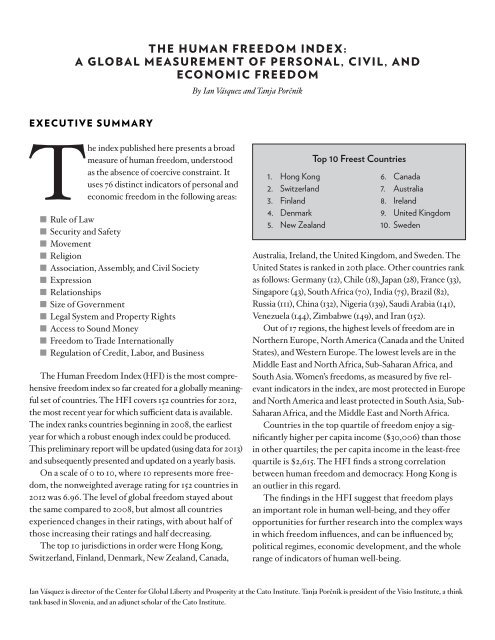P R E L I M I N A R Y R E P O R T
Rc8D1
Rc8D1
Create successful ePaper yourself
Turn your PDF publications into a flip-book with our unique Google optimized e-Paper software.
THE HUMAN FREEDOM INDEX:A GLOBAL MEASUREMENT OF PERSONAL, CIVIL, ANDECONOMIC FREEDOMBy Ian Vásquez and Tanja PorčnikEXECUTIVE SUMMARYThe index published here presents a broadmeasure of human freedom, understoodas the absence of coercive constraint. Ituses 76 distinct indicators of personal andeconomic freedom in the following areas:■■Rule of Law■■Security and Safety■■Movement■■Religion■■Association, Assembly, and Civil Society■■Expression■■Relationships■■Size of Government■■Legal System and Property Rights■■Access to Sound Money■■Freedom to Trade Internationally■■Regulation of Credit, Labor, and BusinessThe Human Freedom Index (HFI) is the most comprehensivefreedom index so far created for a globally meaningfulset of countries. The HFI covers 152 countries for 2012,the most recent year for which sufficient data is available.The index ranks countries beginning in 2008, the earliestyear for which a robust enough index could be produced.This preliminary report will be updated (using data for 2013)and subsequently presented and updated on a yearly basis.On a scale of 0 to 10, where 10 represents more freedom,the nonweighted average rating for 152 countries in2012 was 6.96. The level of global freedom stayed aboutthe same compared to 2008, but almost all countriesexperienced changes in their ratings, with about half ofthose increasing their ratings and half decreasing.The top 10 jurisdictions in order were Hong Kong,Switzerland, Finland, Denmark, New Zealand, Canada,Top 10 Freest Countries1. Hong Kong 6. Canada2. Switzerland 7. Australia3. Finland 8. Ireland4. Denmark 9. United Kingdom5. New Zealand 10. SwedenAustralia, Ireland, the United Kingdom, and Sweden. TheUnited States is ranked in 20th place. Other countries rankas follows: Germany (12), Chile (18), Japan (28), France (33),Singapore (43), South Africa (70), India (75), Brazil (82),Russia (111), China (132), Nigeria (139), Saudi Arabia (141),Venezuela (144), Zimbabwe (149), and Iran (152).Out of 17 regions, the highest levels of freedom are inNorthern Europe, North America (Canada and the UnitedStates), and Western Europe. The lowest levels are in theMiddle East and North Africa, Sub-Saharan Africa, andSouth Asia. Women’s freedoms, as measured by five relevantindicators in the index, are most protected in Europeand North America and least protected in South Asia, Sub-Saharan Africa, and the Middle East and North Africa.Countries in the top quartile of freedom enjoy a significantlyhigher per capita income ($30,006) than thosein other quartiles; the per capita income in the least-freequartile is $2,615. The HFI finds a strong correlationbetween human freedom and democracy. Hong Kong isan outlier in this regard.The findings in the HFI suggest that freedom playsan important role in human well-being, and they offeropportunities for further research into the complex waysin which freedom influences, and can be influenced by,political regimes, economic development, and the wholerange of indicators of human well-being.Ian Vásquez is director of the Center for Global Liberty and Prosperity at the Cato Institute. Tanja Porčnik is president of the Visio Institute, a thinktank based in Slovenia, and an adjunct scholar of the Cato Institute.


